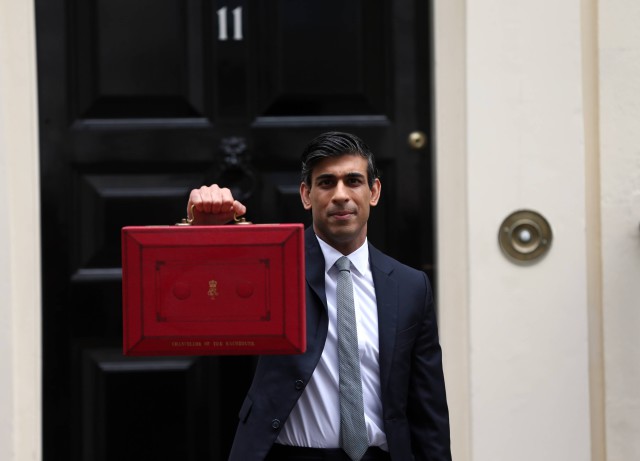A tax move Rishi can defend

Chancellor Rishi Sunak might be getting a real pounding in the press over his family’s tax affairs, but his judgement could not be faulted over some of the changes he announced in his Spring Statement, according to the Building Engineering Services Association (BESA).
Before the storm broke over No.11 Downing Street, the Chancellor was widely praised for putting energy and carbon reduction of the built environment at the heart of his Spring Statement.
He made a welcome move in bringing forward business rate relief on plant and machinery used in onsite renewable energy generation and storage by a year; and by providing 100% tax relief on eligible low carbon heat networks.
These initiatives will be a significant boost to the UK’s plans for decarbonising buildings and could save businesses more than £200m while helping the UK achieve its net zero ambitions, according to BESA.
The Chancellor’s decision to abolish VAT on the installation of domestic energy saving measures, including insulation, solar panels, and heat pumps, for five years should also be warmly welcomed. The Association said this would help to drive uptake of carbon reducing technologies and cut energy bills for millions of households.
The Chancellor has cut VAT on heat pump installations from 5% to zero and considerably simplified the rules about which types of heat pump qualify. Previously, those used for cooling were not eligible for the reduced tax rate, but the only rule that applies now is that the installation must be capable of heating the home.
Complex
“The cut in VAT is a welcome incentive for business and domestic users, but equally helpful is the simplification of what had been unnecessarily complex tax rules around heat pumps,” said BESA’s head of technical Graeme Fox.
“Previously, air source heat pumps of the split air conditioning type had been specifically ruled out from the reduced VAT scheme,” he explained. “This rule was amended last year, but people were still confused. So, following lengthy talks between the BESA and HMRC, the guidance has been updated to clarify that air source reverse cycle heat pump air conditioners can be treated in the same way as monobloc heat pumps for VAT purposes.”
Sunak said Brexit had given him greater freedom to reform UK tax rules and be more innovative in support of key sectors.
“Thanks to Brexit, we are no longer constrained by EU law,” the Chancellor said. “So, I can announce that for the next five years, homeowners having materials like solar panels, heat pumps or insulation installed will no longer pay 5% VAT. They will pay zero.
“We will also reverse the EU's decision to take wind and water turbines out of scope and zero rate them as well. And we will abolish all the red tape imposed on us by the EU.”
The Chancellor is also doubling the size of the Household Support Fund to £1bn, which he said could be used by local authorities to provide more financial support to fuel poor households.
However, it would have been good to see the government following these positive moves up with more support for energy efficiency in the Energy Security Strategy it published in April. This did not include any new money to help homeowners improve insulation even though most existing housing was built before 1973 – the year when insulation standards were improved.

The government has opted instead for a consumer-led approach, in the belief that the Chancellor’s incentives – like the zero VAT rate on energy saving materials and the £450m boiler upgrade scheme, which is designed to encourage people to install heat pumps – will drive demand. With household budgets under intense pressure that might be a forlorn hope.
“On aesthetics, upgrades can retain and enhance building’s character with measures being easy to install and beautiful in design,” the Strategy states. “On choice, this is not being imposed on people and is a gradual transition following the grain of behaviour. The British people are no-nonsense pragmatists who can make decisions based on the information.”
BESA believes the government will eventually be forced to go further and that retrofitting millions of homes and thousands of commercial buildings will be essential to improve energy security in the long run.
Progressive
“These progressive tax moves are a good start towards a more ambitious national programme that will be needed to tackle lifecycle carbon emissions and set us properly on the path to net zero,” said Fox. “But they are just a start.”
He also urged the government to consult with the industries directly involved in the decarbonisation of heat, including building services engineering, to fully understand the implications of its policy proposals not least on the need for investment in training and skills.
“The new incentives will increase demand for competent companies and skilled individuals able to work with these technologies to ensure installations achieve their maximum potential,” said Fox.
“We must, therefore, work together to develop a national training programme for low carbon heating to ensure we have the skills to deliver solutions on a scale that can both help tackle climate change and give consumers protection from rising bills.”
Gathering actual energy consumption data – rather than projected or estimated statistics – will also be increasingly important. Greater take up of smart metering and open-source data sharing would provide building managers with a clearer picture of where they can make the biggest savings and could be linked to specific technical improvements. This could, therefore, inform investment choices.
“Gathering data and then turning it into something useful around which building operators can build an energy and carbon reduction strategy could unlock millions of pounds in savings every year,” said Fox. “It would also move us relatively quickly and cheaply towards the government’s longer-term goals.
“There is a very strong case for getting back to engineering fundamentals here. Poor energy performance of a building is usually an indicator of wider problems with its overall design and operation so there are comfort and safety implications as well.”
BESA continues to stress the importance of approaching a building as a “complete system” rather than as a series of loosely connected components. Encouraging a more joined up approach with control systems driven by real-time energy data would be key to delivering the government’s carbon reduction goals – including making meaningful inroads into lifecycle and embodied carbon.







